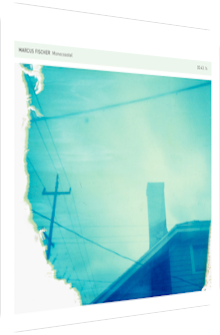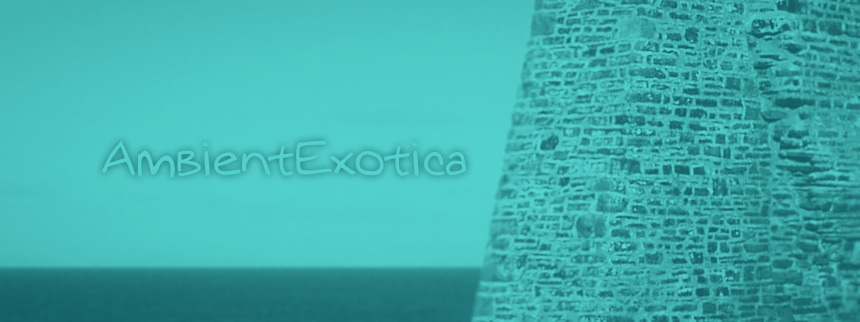
Marcus Fischer
Monocoastal
2010
A little personal background story about the following review of Portland-based multi-talent Marcus Fischer’s debut on the 12k label, Monocoastal, which has been released in 2010: I’ve bought it on CD in the same year, but during my commutes and university-related tasks at the time, the album got lost somehow, and I’m sure I’ll find it in the attic with a bunch of other gems and dobs, so don’t shed any tears. During a recent vacation I’ve decided to finally review Fischer's work, since it has grown on me as I’ve listened to it in several seasons, on various occasions and during different tasks. One can say that I was really in the mood to write my thoughts right now, in that very moment. Bad luck! I didn’t take it with me in digital form, nor was it in the cloud, and even though I have listened to the album time and again, there are passages I haven't memorized yet, so what to do? Buying it again, since the 12k Summer sale was on. The luck of the draw! You’re about to read a somewhat glowing review of a fragile Drone/Glitch hybrid. Its several ornaments make it special, but could possibly turn off fans of the genre: Monocoastal doesn’t present balmy synth washes that tuck the listener in. Nor is it a proper Glitch album with eclectic percussive particles. It is, to make things easy, an Ambient album that focuses as much on guitar melodies, synth textures and misty field recordings as it does on the concept of space and emptiness. Fischer’s music is characterized by holes and niches that lack any trace of sound. They have to be filled first, and this is done through the concoction of manifold sound layers. The listener hence encounters a constant dependance on sound, sustain and space; this triad begs for your attention, and while Monocoastal is perfectly capable of enhancing various tasks on your desk, a concentrated, dedicated listening session expands the soundscape even more. As I’m mentioning every so often in my reviews, I am no synesthete, but the coalescence of the album artwork, as photographed by Marcus Fischer himself, with the music is not only persuasive, but very poignant as well. If you know the 12k label by heart, you own this album anyway. Some people even own it twice, hehe. But if you aren’t sure about the frostiness of the Glitch genre, the concept of emptiness in Ambient music or guitars in general, I invite you to read about the eight tracks off Monocoastal in greater detail.
Wave Atlas is the point of departure, and right from the get-go does the skilled artist present a superimposition of entangled layers which are incredibly fragile and tenuous on their own, but form a mesmeric flow in tandem: whether it’s the the heavily filtered acoustic guitar twangs, the wafting haze of pink noise, the various crackles and clicks whose sustain conflates with the forlorn background or the ambiguously piercing gentleness of the gelid lo-fi drones, each element is equipollent to the next. Even the lack of sound is essential, as this setting allows a liquedous interplay between empty alcoves and noise-fueled fissures. The tranquility of this floats through every pore of the multiple textures and leads to the best characteristic trait of Wave Atlas: its Asian tone sequences which are further boosted by Fischer’s way of plucking his guitar, as it resembles a Japanese three-stringed shamisen or koto. Nowhere is it mentioned that the artist had Far Eastern coasts in mind, and yet does the flavor of the guitars in juxtaposition to the crystalline pastel colors of the synths create a placeless dreamscape that relies as much on the aural grain as it does on the melodies themselves. This opener is deeply relaxing and one of my favorite Ambient compositions ever created, as it is loaded with several sounds and yet feels eminently lightweight. It really rocks my world! The following Mossbank launches with a blurred field recording of a bustling craft enterprise (or so it seems), another creek of swirling static noise, positively spectral synth sweeps and turquoise-tinted acoustic guitar licks with both a crunchier attack rate and a solemn jolliness attached. Since the melodies are stretched and played very slowly, the strings resonate with the insinuated vault-like backdrop, and the depicted microscopic gaze refers back to the track title. The concept of depth is definitely one of the signature characteristics, and while the mood is slightly melancholic, the warmth of the strings forms another oxymoron, namely a majestic humbleness. Monocoastal (Part 1) resumes the phantasmagoric mood of its predecessors, but truly fathoms the concept of misty ocean-resembling waves, frosty clicks and hypnotic hissing. These elements are intermingled with multiple layers of guitar drones, all of them inheriting the endemically sublime aura. Mercurial music box-like scintillae illuminate the Drone structure near the end, and it is here at the latest that one realizes the withdrawal of the foggier ingredients. The next mélange, Cascadia Obscura, provides an interesting counterpoint, as it is admittedly built with the same molecules and particles, but sounds much fuller, more saturated and definitely sun-soaked due to the meandering bass drones, the return of a certain Far Eastern tonality à la Tetsu Inoue and downright coruscating guitar sparks which literally jump right at the listener. They aren’t acidic or hazardous but eupeptic and gleeful. Ambient fans who favor more melodious settings will be pleased with this particular tune.
Wind And Wake is a celestial field recording-focused arrangement of the aquatic kind, with a panorama of grey-colored pouring rain, embellished traffic noise and golden-shimmering electro-acoustic drones that fend off any glints of a potentially doleful atmosphere thanks to the thermal heat Fischer unleashes with the help of cleverly used flanger filters and vivifying bass bursts. The sounds occasionally shift into corrosively vitriolic places, but this just shows the great power that is needed to fight the melancholia, as the strings gleam and glow in order to outshine the gurgling drench. It is during the last minute that the formerly hidden Far Eastern melody is put to the forefront, resembling the peaceful scheme of Brian Eno's early works, especially so Music For Airports of 1978. Shape To Shore ventures into converse realms: the warmth of abyssal bass guitar eruptions meshes with the sky-high clangs of cowbells and plinking wind chimes, creating a nostalgic reel that is both mollifying and at times portentous, as gloomy synth streams in minor reside around the four-and-a-half minute mark; suddenly, the wide space in the background becomes hollow, but after a course correction, the guitar tones recapture the coziness. Shape To Shore shows that darker undertones can be found in Marcus Fischer’s work, but neither do they distract from the overarching theme of Monocoastal, nor do they alienate the listener, let alone destroy this composition. And sure enough does the penultimate track Between Narrow And Small return to the auspicious silkiness of guitar drones, but with an added twist, as the opening phase is unsuspectedly lively, with heavily pulsating staccato bubbles complete with incidental screeches and delicate crackles. The pulses get more streamlined as the song progresses and makes room for the wonderful warmness of the guitars with an added opalescence in form of both a twinkling glockenspiel-like luminescence and enigmatic whistles, but they are never completely out of sight and continue to chuggle through the track. Also worth mentioning is the different sound of the used guitar. It seems as if Fischer used a steel guitar on here, but I might be wrong; the dreaminess is nonetheless expanded and the guitar sounds gorgeous, as does the sustain of the strings that is allowed to float into the distance. The final Monocoastal (Part 2) introduces a fulminant ground loop, probably the drone sound that is easiest to create. Melodies are exchanged for a presentation of various filters and textures: one-note synth strings, bells, clicks and guitars meet, mesh and depart, all the while the ground loop is wafting as the golden thread through the arrangement. This is without a doubt the most experimental of Fischer’s assembled tracks, despite the implied monotony and scarcity of the carved out melodies. Different tone pitches and characteristic traits flourish incessantly until Monocoastal ends on a heavenly polyphonous, vibraphone-esque note.
Monocoastal is a strong "second debut" by Marcus Fischer on the 12k label, and I can once again not exactly pinpoint whether the front artwork resembles the music or vice versa. Different hues and tinges of blue are all over the album, and there are scents of grey and gold intermixed that mainly derive from the deliberately hazy field recordings and the powerful yet fragile guitar setups. The opening track Wave Atlas is, at least to my ears, an essential masterpiece to which I keep coming back time and again, as it is perfectly balanced and provides the right amounts of peacefulness, non-clichéd Far Eastern tone sequences, an intriguing interplay between sound and space as well as an exceptional feeling of contentment. I don’t know why it is exactly this track that causes me to rave about it, for the remaining material delivers exactly the same successful formula of guitar layers and scintillating bells. Synth washes are scattered few and far between, and they’re never colossal or bodacious but always carefully injected into the tracks. I am stressing this fact because Fischer doesn’t want to encapsulate the listener in-between piles of synth layers. Guitar patterns and the textures of the various particles and clicks are much more important, even more so in regard to the ubiquitous backdrop of each composition: emptiness. Since there are no synth washes to be found, the omission of sound becomes an important instrument itself, for it allows the sustain to float into the distance and the bells to sparkle all the lovelier. This perception doesn’t even change when a diffuse field recording or source of pink noise is added, as these whitewashed, moiré-like devices aren’t played on a constant volume level, but oscillate and breeze and therefore depend on quiet surroundings as well. Monocoastal is a strong, surprisingly melodious release, but if you are wary of Drone music that is penetrated by gaps and leaks of space and quiescence, I advise you to listen to both Marcus Fischer’s real and astonishingly well-tempered debut Arctic/Antarctic or Collected Dust which adopts the crystalline structures of his 12k debut, but features a lot of Drone tracks in the traditional sense, namely with a constant flow of sound waves.
Further reading and listening:
- Marcus Fischer’s Twitter account is @mapmap.
- Cory Allen and Mike Vernusky talk to Marcus Fischer in great detail on their superb Quiet Design Podcast, episode 2, released on July 15th, 2012. A must-listen, very entertaining and yet analytical – with a special little guest who answers some important questions in the middle section of the podcast!
Ambient Review 108: Marcus Fischer – Monocoastal (2010). Originally published on Aug. 15, 2012 at AmbientExotica.com.
